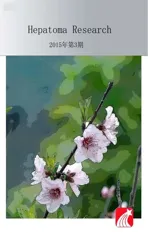Natural products and hepatocellular carcinoma
2015-03-17
Food Toxicology and Contaminants Department, National Research Center, Dokki, Cairo 12622, Egypt
Topic: Natural Products and Hepatocellular Carcinoma
Natural products and hepatocellular carcinoma
Mosaad A. Abdel-Wahhab
Food Toxicology and Contaminants Department, National Research Center, Dokki, Cairo 12622, Egypt
Address for correspondence:
Prof. Mosaad A. Abdel-Wahhab, Food Toxicology and Contaminants Department, National Research Center, Dokki, Cairo 12622, Egypt. E-mail: mosaad_abdelwahhab@yahoo.com
Hepatocellular carcinoma (HCC) is a major health problem, with more than 500,000 cases diagnosed annually. It is also an important cause of human mortality in the world. The incidence of HCC is rising due to the widespread of hepatitis and alcoholism, which may be caused by infection, injury, exposure to drugs or toxic compounds, autoimmunity, or genetic defect that leads to the deposition of harmful substances.[1]
In the broadest sense, natural products (NPs) are chemical compounds or substances produced by a living organism found in nature.[2,3]Consequently, NPs can be extracted from animals, plants, microbes, and marine organisms.[4,5]NPs can be considered as a coin with two sides, which have to be considered in the application in modern or alternative medicine. Some NPs have beneficial effects while some others have toxic effects. For example, mycotoxins and some other microbial toxins are carcinogenic, and the International Agency for Research on Cancer classified several mycotoxins as hepatocarcinogenic.[6]Exposure to some mycotoxins resulted in liver cancer,[7-10]especially aflatoxin B1, which is a mutagenic natural compound that contaminates many food sources in some parts of Africa and Asia and is recognized as hepatocarcinogens in humans and many animal species.[7,11]
The use of herbal medicines can be traced back several thousand years ago in ancient China, ancient Egypt and ancient Roma. Recent research pointed out an increasing interest concerning the health benefits of a diet rich in NPs.[12]NPs can act as chemoprotective agents against common liver diseases, such as hepatitis, cirrhosis, liver cancer, fatty liver diseases, and gallstones.[1]
In general, NPs play a key role in drug discovery and are also a prolific source of novel lead compounds or pharmacophores for medicinal chemistry. Although naturally active substances are usually good lead compounds, most of them can hardly satisfy the demands for druggability. Hence, these structural phenotypes have to be modified and optimized to overcome existing deficiencies and shortcomings.[13]
Although HCC is always hard to treat, this special issue aims to gather updated progress in this important area and shed the light on the possibility to introduce a new drug based on the benefit of NPs.
Financial support and sponsorship
Nil.
Conf ict of interest
There is no conflict of interest.
REFERENCES
1. Ling CQ, Chiu JH, Oh B, Cho WC. Natural products for liver diseases: basic, clinical, and translational research.EvidBasedComplement AlternatMed2012;2012:794343.
2. Cutler SJ, Cutler HG. Biologically active natural products: pharmaceuticals. Boca Raton: CRC Press; 2000.
3. Samuelson G. Drugs of natural origin: a textbook of pharmacognosy. New York: Taylor and Francis Ltd.; 1999.
4. Baker DD, Chu M, Oza U, Rajgarhia V. The value of natural products to future pharmaceutical discovery.NatProdRep2007;24:1225-44.
5. Cragg GM, Newman DJ. Natural products: a continuing source of novel drug leads.BiochimBiophysActa2013;1830:3670-95.
6. International Agency for Research on Cancer. Some naturally occurring substances: food items, constituents, heterocyclic aromatic amines, mycotoxins. In: IARC monographs on the evaluation of carcinogenic risks to humans. Lyon: IARC; 1993. p. 249-395.
7. Abdel-Wahhab MA, Hassan NS, El-Kady AA, Khadrawy AY, El-Nekeety AA, Mohamed SR, Sharaf HA, Mannaa FA. Red ginseng extract protects against af atoxin B1and fumonisins-induced hepatic pre-cancerous lesions in rats.FoodChemToxicol2010;48:733-42.
8. Abdel-Wahhab MA, Ibrahim AA, El-Nekeety AA, Hassan NS, Mohamed AA. Panax ginseng C.A. Meyer extract counteracts the oxidative stress in rats fed multi-mycotoxins-contaminated diet.ComunSci2012;3:143-53.
9. Abdel-Wahhab MA, El-Denshary ES, El-Nekeety AA, Hassan NS, Abu-Salem FM, Sarhan NA, Rihn BH. Impact of soy isof avones on af atoxin-induced oxidative stress and hepatotoxicity in rats.GenHealth MedSci2014;1:9-14.
10. Abdel-Wahhab MA, Aljawish A, El-Nekeety AA, Abdel-Aiezm SH, Abdel-Kader HA, Rihn BH, Joubert O. Chitosan nano particles and quercetin modulate gene expression and prevent the genotoxicity of af atoxin B1in rat liver.ToxicolRep2015;2:737-47.
11. Hassan AM, Abdel-Aziem SH, Abdel-Wahhab MA. Modulation of DNA damage and alteration of gene expression during af atoxicosis via dietary supplementation of Spirulina (Arthrospira) and whey protein concentrate.EcotoxicolEnvironSaf2012;79:294-300.
12. Marginȃ D, Ilie M, Grȃdinaru D, Androutsopoulos VP, Kouretas D, Tsatsakis AM. Natural products-friends or foes?ToxicolLett2015;236:154-67.
13. Chen J, Li W, Yao H, Xu J. Insights into drug discovery from natural products through structural modification.Fitoterapia2015;103:231-41.
Received: 14-06-2015, Accepted: 09-07-2015
DOⅠ: 10.4103/2394-5079.161626
This is an open access article distributed under the terms of the Creative Commons Attribution-NonCommercial-ShareAlike 3.0 License, which allows others to remix, tweak, and build upon the work non-commercially, as long as the author is credited and the new creations are licensed under the identical terms.
For reprints contact: reprints@medknow.com
How to cite this article: Abdel-Wahhab MA. Natural products and hepatocellular carcinoma. Hepatoma Res 2015;1:107-8.
杂志排行
Hepatoma Research的其它文章
- Natural products and hepatocellular carcinoma: a review
- Expectations for partial splenic arterial embolization simultaneous transcatheter arterial chemoembolization for hepatocellular carcinoma
- Microwave coagulation therapy of hepatocellular carcinoma
- Can sorafenib be discontinued in hepatocellular carcinoma patients with a complete response to treatment?
- Effects of natural compounds in treatment and prevention of hepatotoxicity and hepatocellular carcinoma
- Preventive role of chamomile f owers and fennel seeds extracts against liver injury and oxidative stress induced by an immunosuppressant drug in rattss
